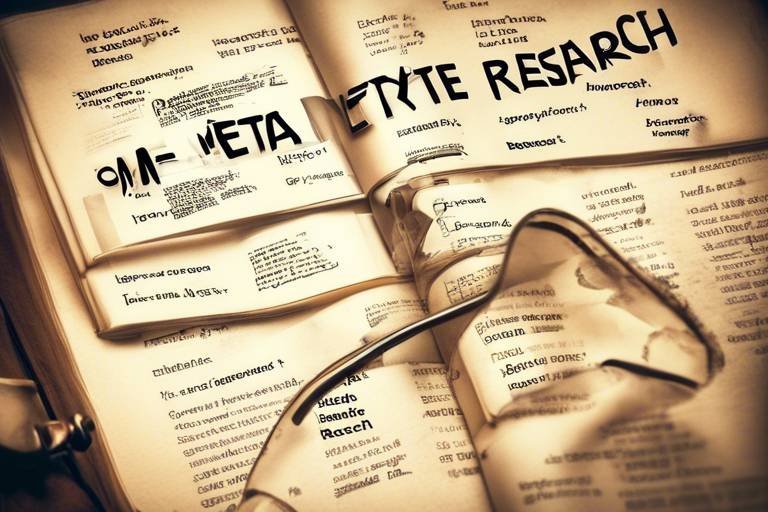How to Conduct Research Using Blockchain Technology
In the rapidly evolving landscape of technology, blockchain has emerged as a transformative force, particularly in the realm of research. Imagine a world where data is not only secure but also transparent and immutable; that's the promise of blockchain technology. By leveraging its unique features, researchers can enhance the integrity and reliability of their findings, paving the way for groundbreaking discoveries. But how exactly can one conduct research using blockchain? This article dives deep into the innovative applications of blockchain technology in research, detailing its benefits, challenges, methodologies, and the exciting trends shaping its future.
To effectively conduct research using blockchain, it is essential to grasp the foundational concepts of blockchain technology. At its core, blockchain is a decentralized ledger that records transactions across multiple computers. This means that once data is entered into the blockchain, it cannot be altered, ensuring a high level of data integrity. There are various types of blockchains, including public, private, and consortium blockchains, each serving different purposes and functionalities. Understanding these differences is crucial for researchers aiming to utilize blockchain effectively. For instance, public blockchains like Bitcoin are open to anyone, while private blockchains are restricted to specific users, offering more control over data access and privacy.
Blockchain technology offers numerous advantages for research. One of the most significant benefits is enhanced data integrity. With traditional databases, data can be manipulated or deleted, leading to potential inaccuracies in research findings. However, blockchain's immutable nature ensures that once data is recorded, it remains unchanged. Additionally, blockchain promotes transparency by allowing all participants in the network to access the same information, fostering trust among researchers and stakeholders. Security is another critical advantage; blockchain employs advanced cryptographic techniques to protect data from unauthorized access, ensuring that sensitive information remains confidential. These benefits can significantly improve the credibility and reliability of research findings across various fields, from healthcare to finance.
Despite its potential, blockchain technology presents certain challenges that researchers must navigate. One major issue is scalability. As the number of transactions increases, maintaining speed and efficiency can become problematic. Additionally, regulatory concerns surrounding blockchain can pose hurdles, particularly in industries like healthcare where data privacy is paramount. Researchers also face the challenge of needing interdisciplinary knowledge; understanding both the technical aspects of blockchain and the specific field of study is essential for effective implementation. These challenges, while significant, can be addressed through collaboration and continued education.
When it comes to integrating blockchain into research, several methodologies can be adopted. Researchers may employ qualitative approaches, such as interviews and case studies, to explore the implications of blockchain in their field. Alternatively, quantitative methods can be utilized to analyze data patterns and trends. For instance, experimental designs can be used to test the effectiveness of blockchain in improving data integrity in clinical trials. Each methodology has its strengths and can be tailored to fit the specific research objectives, ensuring comprehensive insights into blockchain's impact.
Examining real-world applications of blockchain in research showcases its transformative potential across various sectors. In healthcare, blockchain is being used to secure patient records and streamline clinical trials, enhancing data sharing while protecting patient privacy. The finance sector has also embraced blockchain, with research focusing on its ability to improve transaction transparency and reduce fraud. Furthermore, in supply chain management, blockchain is revolutionizing how products are tracked and verified, ensuring authenticity and reducing losses. These examples illustrate the practical implementations of blockchain technology and its promising outcomes, inspiring researchers to explore its possibilities further.
The future of blockchain research is promising, with emerging trends that are set to shape the landscape of research methodologies and applications. Concepts such as decentralized finance (DeFi) are gaining traction, offering new avenues for financial research and innovation. Additionally, the rise of non-fungible tokens (NFTs) is transforming how digital assets are perceived and valued, opening up new research opportunities in art, gaming, and beyond. Enhanced interoperability between different blockchain systems is also anticipated, which could lead to more comprehensive and integrated research outcomes. Keeping an eye on these trends will be essential for researchers looking to stay ahead of the curve.
As with any technological advancement, ethical considerations surrounding blockchain research cannot be overlooked. Issues such as data privacy, informed consent, and the implications of decentralized systems are crucial for maintaining integrity and trust within the research community. Researchers must navigate these ethical dilemmas carefully, ensuring that their work adheres to established guidelines and respects the rights of individuals involved. By prioritizing ethics, researchers can foster a culture of responsibility and accountability in blockchain research.
Collaboration among researchers from various disciplines is vital for advancing blockchain technology in research. By fostering innovation and addressing complex challenges through shared expertise and resources, researchers can enhance the effectiveness of their studies. Interdisciplinary approaches not only enrich the research process but also encourage the exchange of ideas, leading to more comprehensive and impactful findings. Building networks and partnerships will be key to unlocking the full potential of blockchain in research.
A variety of tools and resources are available to assist researchers in utilizing blockchain technology. Platforms like Ethereum and Hyperledger provide frameworks for developing blockchain applications, while educational materials and online courses can help researchers build their knowledge. Additionally, software solutions designed for data analysis can facilitate effective research practices. By leveraging these tools, researchers can enhance their understanding of blockchain and its applications, ultimately leading to more robust research outcomes.
- What is blockchain technology?
Blockchain is a decentralized ledger that records transactions across multiple computers, ensuring data integrity and security. - How can blockchain improve research?
Blockchain enhances data integrity, transparency, and security, which can improve the credibility of research findings. - What are the challenges of using blockchain in research?
Challenges include scalability issues, regulatory concerns, and the need for interdisciplinary knowledge. - What methodologies can be used for blockchain research?
Researchers can adopt qualitative and quantitative methodologies, including case studies and experimental designs. - What are some real-world applications of blockchain in research?
Blockchain is used in healthcare, finance, and supply chain management to enhance data security and transparency.

Understanding Blockchain Basics
To effectively conduct research using blockchain, it is essential to grasp the foundational concepts of blockchain technology. At its core, blockchain is a decentralized digital ledger that records transactions across multiple computers in such a way that the registered transactions cannot be altered retroactively. This means that once a piece of data is added to the blockchain, it is permanently etched in stone, creating a robust layer of data integrity that is hard to compromise.
Now, let's break down the main components that define blockchain technology:
- Blocks: Each block contains a list of transactions. When a block is filled, it is added to the chain of previous blocks, forming a secure and chronological order of data.
- Nodes: These are the individual computers that are part of the blockchain network. Each node has a copy of the entire blockchain, ensuring transparency and security.
- Consensus Mechanisms: This is how the network agrees on the validity of transactions. Common mechanisms include Proof of Work (PoW) and Proof of Stake (PoS), which help prevent fraud and ensure that all nodes are synchronized.
Blockchain can be categorized into several types, each serving different purposes:
- Public Blockchains: Open to anyone, these blockchains allow any user to participate in the network. Bitcoin is a prime example.
- Private Blockchains: These are restricted networks where only authorized users can participate. They are often used by businesses for internal operations.
- Consortium Blockchains: A hybrid of public and private, these blockchains are governed by a group of organizations, allowing for shared control and collaboration.
Understanding these basics is crucial for researchers looking to leverage blockchain technology in their studies. The unique characteristics of blockchain—such as its transparency, security, and immutability—set it apart from traditional databases, making it a powerful tool for enhancing the credibility and reliability of research findings. As you delve deeper into blockchain, you'll find that its potential applications are vast and varied, touching upon numerous fields from healthcare to finance.
In conclusion, having a solid grasp of blockchain fundamentals is the first step toward harnessing its capabilities in research. As you explore this fascinating technology, keep in mind how its innovative features can drive new methodologies and insights in your work.

Benefits of Using Blockchain in Research
When we think about the world of research, one of the biggest challenges researchers face is ensuring the integrity and credibility of their findings. Enter blockchain technology, a revolutionary tool that can reshape the way we conduct research. Imagine a world where data is not only secure but also transparent and immutable. That’s the promise blockchain brings to the table. By leveraging its unique characteristics, researchers can enhance the trustworthiness of their work, making it a game-changer in various fields.
One of the most significant benefits of using blockchain in research is its ability to ensure data integrity. With traditional databases, data can be altered or tampered with, leading to questionable outcomes. However, blockchain operates on a decentralized network where every transaction is recorded in a block and linked to the previous one, creating a chain of information that is nearly impossible to modify without consensus from the network. This means that once data is entered into the blockchain, it remains unchanged, providing a reliable source of truth for researchers.
Another advantage is the transparency that blockchain offers. In a traditional research setting, data sharing can often be a murky process, with questions surrounding who has access to data and how it is used. Blockchain allows for a transparent system where all participants can view the data and its history, fostering a culture of openness and accountability. This can lead to greater collaboration among researchers and institutions, as everyone can trust the data being shared.
Additionally, blockchain technology enhances security. In an age where data breaches and cyberattacks are rampant, the security features of blockchain can protect sensitive research data. Each transaction is encrypted, and since there is no central point of failure, the risk of data loss or corruption is significantly minimized. This is particularly crucial for fields like healthcare research, where patient information must be handled with the utmost care.
Moreover, blockchain can facilitate efficient funding and grant management. Traditionally, securing funding for research can be a lengthy and complicated process. With blockchain, researchers can create smart contracts that automate funding disbursements based on predefined milestones. This not only streamlines the funding process but also ensures that funds are used appropriately, as every transaction is recorded and traceable.
To sum it up, the benefits of using blockchain in research are significant and multifaceted. They include:
- Enhanced data integrity through immutable records
- Increased transparency for collaborative efforts
- Improved security against data breaches
- Streamlined funding processes via smart contracts
As we continue to explore the potential of blockchain in research, it's clear that its innovative applications can lead to more reliable, secure, and efficient research practices. The future of research could very well depend on how effectively we can harness this technology to overcome the challenges of today.
Q: What is blockchain technology?
A: Blockchain technology is a decentralized digital ledger that records transactions across many computers in a way that the registered transactions cannot be altered retroactively.
Q: How does blockchain ensure data integrity?
A: Blockchain ensures data integrity by creating an immutable record of transactions. Once data is added to the blockchain, it cannot be changed without the consensus of the network.
Q: Can blockchain be used in all areas of research?
A: Yes, blockchain can be applied in various fields, including healthcare, finance, and social sciences, to enhance transparency, security, and data integrity.
Q: What are smart contracts?
A: Smart contracts are self-executing contracts with the terms of the agreement directly written into code. They automatically enforce and execute the terms of the contract based on predefined conditions.

Challenges and Limitations
While blockchain technology is a revolutionary force in the realm of research, it doesn't come without its fair share of . One of the most significant hurdles is scalability. As more users join the blockchain network, the volume of transactions increases, which can lead to slower processing times and higher costs. Think of it like a busy highway during rush hour; the more cars that join, the longer it takes to reach your destination. For researchers, this can mean delays in data retrieval and analysis, which can hinder the pace of their studies.
Another major concern is regulatory compliance. Blockchain operates in a decentralized manner, which can clash with existing regulations that govern data handling and privacy. Researchers must navigate a complex landscape of laws that may not yet fully account for blockchain technology. This uncertainty can create apprehension among researchers and institutions, making them hesitant to adopt blockchain solutions. It's like trying to play a game without knowing the rules; it can be frustrating and lead to mistakes.
Furthermore, the need for interdisciplinary knowledge poses a challenge. Blockchain is not just a technical issue; it intersects with various fields such as law, economics, and ethics. Researchers must equip themselves with a broad understanding of these areas to effectively implement blockchain in their studies. This requirement can be daunting, especially for those who may not have a background in technology or law. The learning curve can feel steep, almost like trying to learn a new language overnight.
Moreover, there are also security concerns that need to be addressed. While blockchain is often touted for its security features, vulnerabilities can still exist, particularly in smart contracts and wallet systems. Researchers must be vigilant and ensure that their data is protected from potential breaches or hacks. It's akin to locking your front door but forgetting to secure your windows; you may still be at risk.
Lastly, the cost of implementation can be a barrier for many research institutions. Setting up a blockchain system requires not only financial investment but also time and resources for training personnel. For smaller institutions or independent researchers, this can pose a significant challenge. They may find themselves in a position where they want to harness the benefits of blockchain but are held back by budgetary constraints.
In summary, while blockchain technology holds immense promise for enhancing research practices, it is essential for researchers to be aware of these challenges. Addressing issues of scalability, regulatory compliance, interdisciplinary knowledge, security, and cost will be crucial for fully leveraging the potential of blockchain in research. As we move forward, overcoming these limitations will pave the way for a more integrated and efficient research landscape.
- What is blockchain technology? Blockchain technology is a decentralized digital ledger that records transactions across many computers securely and transparently.
- What are the main challenges of using blockchain in research? The main challenges include scalability, regulatory compliance, the need for interdisciplinary knowledge, security concerns, and implementation costs.
- How can researchers overcome these challenges? Researchers can collaborate with experts from various fields, stay updated on regulations, and invest in training and resources to better understand blockchain technology.
- Is blockchain technology secure for research purposes? While blockchain offers enhanced security features, researchers must remain vigilant about potential vulnerabilities, especially in smart contracts and wallet systems.

Methodologies for Blockchain Research
When diving into the world of blockchain research, it's crucial to adopt the right methodologies to ensure that your findings are robust, reliable, and applicable. Blockchain, with its unique attributes, requires researchers to think outside the box and employ innovative approaches. One effective way to structure your research is by integrating both qualitative and quantitative methodologies. This dual approach allows for a comprehensive understanding of the subject matter, blending numerical data with rich, descriptive insights.
For instance, qualitative research can involve interviews with industry experts, gathering firsthand accounts of how blockchain is being utilized in various sectors. This method not only adds depth to your findings but also helps in identifying emerging trends and real-world challenges faced by practitioners. On the flip side, quantitative research can involve analyzing blockchain transaction data to uncover patterns or trends that might not be immediately apparent. By leveraging statistical tools, researchers can quantify the impact of blockchain on efficiency, cost savings, and data integrity.
Another effective methodology is the case study analysis. This approach allows researchers to conduct an in-depth examination of specific instances where blockchain technology has been implemented. By analyzing these cases, researchers can extract valuable lessons and best practices that can inform future projects. For example, a case study on blockchain in supply chain management could reveal how companies are using the technology to enhance transparency and traceability, ultimately improving consumer trust.
Moreover, experimental designs can also play a significant role in blockchain research. By creating controlled environments to test hypotheses, researchers can isolate the effects of blockchain technology on various outcomes. Imagine setting up a simulated marketplace where transactions occur on a blockchain versus a traditional database; the results could yield fascinating insights into transaction speed, security, and user satisfaction.
It's also worth noting that interdisciplinary collaboration is essential in blockchain research. Since blockchain intersects with various fields such as computer science, economics, law, and social sciences, bringing together experts from these domains can lead to more holistic research outcomes. This collaboration can foster innovative solutions to complex challenges, such as regulatory compliance and ethical considerations surrounding data privacy.
In conclusion, the methodologies for conducting blockchain research are as diverse as the technology itself. By employing a mix of qualitative and quantitative methods, engaging in case study analyses, and fostering interdisciplinary collaboration, researchers can unlock the full potential of blockchain technology. This multifaceted approach not only enriches the research process but also enhances the credibility and applicability of the findings.
- What are the main methodologies used in blockchain research? Researchers often use a combination of qualitative and quantitative methods, case studies, and experimental designs to explore the multifaceted nature of blockchain technology.
- How can interdisciplinary collaboration benefit blockchain research? By bringing together experts from various fields, researchers can address complex challenges and develop innovative solutions that might not be possible within a single discipline.
- What is the significance of case studies in blockchain research? Case studies provide real-world examples of blockchain applications, offering valuable insights and lessons that can inform future research and implementations.

Real-World Applications
When we think about the potential of blockchain technology, it’s easy to get lost in the technical jargon and complex theories. However, the reality is that blockchain is already making significant waves across various sectors. Let’s dive into some of the most impactful real-world applications of blockchain in research, showcasing how this technology is transforming traditional processes and enhancing data integrity.
One of the most compelling examples of blockchain's application is in the healthcare sector. Imagine a world where patient records are securely stored and easily accessible across different healthcare providers. Blockchain enables this by providing a decentralized ledger that ensures data integrity and security. For instance, the MediLedger Project is a prime example, which utilizes blockchain to streamline the supply chain for pharmaceuticals, ensuring that drugs are authentic and tracking their journey from manufacturer to patient.
Another exciting application is in the finance industry. Blockchain technology is revolutionizing how transactions are conducted, offering a level of transparency and security that was previously unattainable. For example, Ripple is utilizing blockchain to facilitate cross-border payments, drastically reducing transaction times from days to mere seconds. This not only enhances efficiency but also minimizes costs, making financial services more accessible to a global audience.
Moreover, blockchain is proving its worth in the supply chain management sector. Companies like IBM and Walmart are leveraging blockchain to create transparent and traceable supply chains. By recording every transaction on a blockchain, stakeholders can trace the origin of products, ensuring ethical sourcing and quality control. This level of transparency not only builds consumer trust but also helps in quickly identifying issues such as product recalls.
In the realm of academic research, blockchain is being used to verify the authenticity of research data and publications. Projects like Authorea are utilizing blockchain to timestamp research papers, ensuring that authors receive credit for their work and that the integrity of the research is maintained. This could potentially reduce instances of plagiarism and enhance the credibility of academic publications.
To summarize, the real-world applications of blockchain technology are vast and varied. From healthcare to finance, supply chain management to academic research, blockchain is not just a buzzword; it’s a transformative force. As we continue to explore and innovate, the potential for blockchain in research and beyond seems limitless.
- What is blockchain technology? Blockchain technology is a decentralized ledger system that records transactions across multiple computers, ensuring that the data cannot be altered retroactively.
- How does blockchain improve data integrity? By using cryptographic techniques, blockchain ensures that once data is recorded, it cannot be changed without the consensus of the network, thus maintaining its integrity.
- Can blockchain be used in any industry? Yes, blockchain has applications in various industries including healthcare, finance, supply chain, and research, among others.
- What are the challenges of using blockchain? Some challenges include scalability issues, regulatory concerns, and the need for interdisciplinary knowledge to effectively implement blockchain solutions.

Future Trends in Blockchain Research
The future of blockchain research is not just bright; it’s positively dazzling! As we stand on the brink of a technological revolution, the implications of blockchain technology are becoming more profound and far-reaching. One of the most exciting trends is the rise of decentralized finance (DeFi). Imagine a world where financial transactions are conducted without traditional intermediaries like banks. This shift not only democratizes access to financial services but also enhances security and reduces costs. Researchers are increasingly exploring how DeFi can reshape economic landscapes, providing new avenues for innovation and inclusivity.
Another trend gaining traction is the development of non-fungible tokens (NFTs). While NFTs are often associated with digital art, their potential extends far beyond that. Researchers are investigating how NFTs can be utilized in various fields, such as intellectual property rights, digital identity verification, and even in academic publishing. The unique characteristics of NFTs offer exciting possibilities for creating verifiable and immutable records in research, which can enhance the credibility of scholarly work.
Moreover, the concept of enhanced interoperability among different blockchain networks is set to revolutionize research methodologies. Currently, many blockchain systems operate in silos, limiting their effectiveness and usability. Future research will likely focus on developing protocols that allow different blockchains to communicate with each other seamlessly. This interoperability could lead to a more integrated approach to data sharing, enabling researchers to collaborate more effectively across various disciplines. Imagine a world where data from healthcare, finance, and supply chain can be accessed and analyzed in real time, leading to groundbreaking discoveries!
As we look ahead, it’s also essential to consider the ethical implications of these advancements. With great power comes great responsibility, and researchers must navigate the complexities of data privacy, consent, and the ethical use of blockchain technology. This is where interdisciplinary collaboration becomes crucial. By bringing together experts from various fields, researchers can address these challenges and ensure that the development of blockchain technology aligns with societal values and ethical standards.
In summary, the future of blockchain research is poised for transformative growth. From decentralized finance to NFTs and enhanced interoperability, the potential applications are vast and varied. However, as we explore these exciting frontiers, it’s vital to remain vigilant about the ethical considerations that accompany such innovations. The journey ahead is sure to be filled with surprises, and researchers who embrace these trends will undoubtedly be at the forefront of shaping the future!
- What is decentralized finance (DeFi)?
DeFi refers to financial services that operate on blockchain technology without traditional intermediaries, enabling peer-to-peer transactions. - How do non-fungible tokens (NFTs) work?
NFTs are unique digital assets verified using blockchain technology, allowing for ownership and provenance tracking of digital items. - Why is interoperability important in blockchain?
Interoperability allows different blockchain systems to communicate and share data, enhancing collaboration and efficiency in research. - What ethical considerations are associated with blockchain research?
Researchers must consider data privacy, consent, and the implications of decentralized systems to maintain integrity and trust.

Ethical Considerations
When diving into the world of blockchain technology, especially in the realm of research, it's crucial to address the that arise. Blockchain, with its promise of transparency and security, also brings forth a host of ethical dilemmas that researchers must navigate. One of the primary concerns is data privacy. Since blockchain operates as a public ledger, the data recorded is often accessible to anyone within the network. This raises questions about how sensitive information, particularly in fields like healthcare or finance, is handled. Researchers must ensure that personal data is anonymized and that consent is obtained before using any data on the blockchain.
Another significant ethical issue is the concept of informed consent. Participants in research studies must be fully aware of how their data will be used, especially when it involves blockchain technology. Many individuals may not fully understand how blockchain works, which can lead to misunderstandings about the permanence and visibility of their data. Thus, researchers are tasked with developing clear communication strategies that explain the implications of their participation in a blockchain-based study.
Furthermore, the decentralized nature of blockchain presents unique ethical challenges. While decentralization promotes fairness and reduces the risk of manipulation, it can also lead to a lack of accountability. If something goes wrong, pinpointing responsibility can be tricky. Researchers must establish clear guidelines and frameworks that outline accountability when utilizing blockchain technology in their studies.
To summarize, here are some key ethical considerations to keep in mind when conducting research using blockchain:
- Data Privacy: Ensure sensitive information is protected and anonymized.
- Informed Consent: Clearly communicate the use and implications of blockchain technology to participants.
- Accountability: Establish frameworks for responsibility in decentralized systems.
As blockchain continues to evolve, maintaining a strong ethical framework will be essential for fostering trust and integrity within the research community. Researchers must stay informed about the ethical implications of their work and strive to create an environment where innovation and ethics go hand in hand.
Q1: What are the main ethical concerns when using blockchain in research?
A1: The main ethical concerns include data privacy, informed consent, and accountability in decentralized systems.
Q2: How can researchers ensure data privacy when using blockchain?
A2: Researchers can ensure data privacy by anonymizing sensitive information and obtaining consent from participants before data collection.
Q3: Why is informed consent crucial in blockchain research?
A3: Informed consent is crucial because participants need to understand how their data will be used and the implications of its permanence on the blockchain.
Q4: What role does accountability play in blockchain research?
A4: Accountability is vital in ensuring that there are clear guidelines for responsibility, especially since blockchain's decentralized nature can complicate accountability.

Collaboration and Interdisciplinary Approaches
In the rapidly evolving world of blockchain technology, the importance of collaboration and interdisciplinary approaches cannot be overstated. Blockchain is not just a technological innovation; it requires a blend of insights from various fields such as computer science, law, economics, and social sciences to fully harness its potential. So, why is this collaborative spirit so crucial? Well, consider blockchain as a complex puzzle. Each piece—whether it's a tech-savvy programmer, a legal expert, or a data analyst—plays a vital role in completing the picture. Without these diverse perspectives, the full benefits of blockchain in research could remain unrealized.
One of the most exciting aspects of blockchain is its ability to foster innovation through collaboration. By bringing together experts from different disciplines, researchers can tackle multifaceted challenges that a single field might struggle with alone. For instance, when developing a blockchain solution for healthcare, input from medical professionals, data scientists, and cybersecurity experts is essential. This collaborative effort can lead to more robust and secure applications that not only serve the healthcare industry but also set a precedent for other sectors.
Moreover, interdisciplinary collaboration encourages the sharing of resources and knowledge, which can significantly accelerate the research process. Imagine a scenario where a team of blockchain developers partners with economists to analyze the potential impact of decentralized finance (DeFi) on global markets. Such collaborations can lead to groundbreaking studies that provide insights into economic behaviors influenced by blockchain technologies. In this way, the intersection of various fields can lead to a richer understanding of how blockchain can be applied effectively.
However, fostering collaboration is not without its challenges. Different disciplines often come with their own terminologies, methodologies, and cultural norms, which can create barriers to communication. To overcome these hurdles, teams should focus on establishing common goals and creating an inclusive environment where all voices are heard. Regular meetings, workshops, and brainstorming sessions can help facilitate this process, ensuring that all team members are aligned and engaged.
In addition to improving communication, leveraging technology can also enhance collaboration. Tools such as project management software, shared digital workspaces, and communication platforms can streamline the collaborative process. For instance, using a platform like Trello or Slack can help teams coordinate their efforts, track progress, and share ideas seamlessly.
In conclusion, the path to successful blockchain research is paved with collaboration and interdisciplinary approaches. By breaking down silos and encouraging teamwork among diverse experts, we can unlock the full potential of blockchain technology. As we move forward, it's imperative that researchers embrace this collaborative spirit to navigate the complexities of blockchain and drive meaningful change across various sectors.
- What is the importance of interdisciplinary collaboration in blockchain research?
Interdisciplinary collaboration is crucial as it combines diverse expertise, leading to innovative solutions and a comprehensive understanding of blockchain applications. - How can teams improve communication among different disciplines?
Establishing common goals, conducting regular meetings, and utilizing collaborative tools can help bridge communication gaps. - What tools can facilitate collaboration in blockchain research?
Tools like Trello, Slack, and various project management software can streamline communication and project tracking among team members.

Tools and Resources for Researchers
In the rapidly evolving world of blockchain technology, researchers have access to a plethora of tools and resources that can significantly enhance their studies. These resources range from software platforms that facilitate blockchain deployment to educational materials that provide in-depth knowledge about blockchain principles and applications. Understanding which tools are available is essential for any researcher looking to leverage blockchain's potential in their work.
One of the most prominent platforms is Ethereum, which not only serves as a blockchain for decentralized applications but also offers extensive documentation and developer tools. Researchers can utilize Ethereum's smart contracts to automate processes and ensure transparency in their studies. Similarly, Hyperledger provides an open-source framework for developing blockchain solutions, making it an attractive option for researchers interested in building custom applications tailored to their specific needs.
For those looking to analyze blockchain data, tools like Chainalysis and Blockchair offer powerful analytics capabilities. These platforms allow researchers to track transactions, analyze trends, and gain insights into user behavior on various blockchains. Such data can be invaluable for studies focused on economic models, security, or even social behavior within decentralized networks.
Furthermore, educational resources play a crucial role in equipping researchers with the necessary knowledge. Online courses from platforms like Coursera and edX provide comprehensive insights into blockchain technology, covering everything from basic concepts to advanced applications. These courses often include case studies and practical exercises, allowing researchers to apply what they learn in real-world scenarios.
In addition to these platforms, researchers can benefit from community-driven resources such as GitHub, where many blockchain projects are open source. Collaborating with other developers and researchers on GitHub can lead to innovative solutions and a better understanding of existing challenges. Moreover, forums like Stack Exchange and Reddit provide spaces for researchers to ask questions, share knowledge, and connect with others in the blockchain community.
To summarize, the tools and resources available for researchers in the blockchain space are diverse and continually expanding. By leveraging platforms like Ethereum and Hyperledger, utilizing data analytics tools, and engaging with educational and community resources, researchers can effectively navigate the complexities of blockchain technology. This not only enhances their studies but also contributes to the broader understanding of blockchain's impact across various fields.
Q: What is the best blockchain platform for research?
A: It depends on the specific needs of your research. Ethereum is great for decentralized applications, while Hyperledger is ideal for enterprise solutions. Assess your requirements to choose the best fit.
Q: Are there any free resources for learning about blockchain?
A: Yes! Platforms like Coursera and edX offer free courses on blockchain technology. Additionally, many blockchain projects provide free documentation and community support.
Q: How can I analyze blockchain data?
A: Tools like Chainalysis and Blockchair provide robust analytics for blockchain data, allowing you to track transactions and analyze trends effectively.
Frequently Asked Questions
- What is blockchain technology?
Blockchain technology is a decentralized digital ledger that securely records transactions across multiple computers. This ensures that the data cannot be altered retroactively without the consensus of the network, making it highly reliable and transparent.
- How does blockchain improve research integrity?
Blockchain enhances research integrity by providing immutable records of data and transactions. This means researchers can trust that their data is accurate and has not been tampered with, which is crucial for maintaining credibility in their findings.
- What are the main challenges of using blockchain in research?
Some of the key challenges include scalability issues, regulatory hurdles, and the need for researchers to possess interdisciplinary knowledge. Navigating these challenges is essential for effectively leveraging blockchain technology in research.
- Can you give examples of real-world applications of blockchain in research?
Absolutely! Blockchain is being used in various sectors such as healthcare for secure patient data management, in finance for transparent transaction records, and in supply chain management for tracking product origins and authenticity.
- What future trends should researchers be aware of?
Researchers should keep an eye on trends like decentralized finance (DeFi), the rise of non-fungible tokens (NFTs), and advancements in interoperability between different blockchain systems. These trends are expected to reshape research methodologies and applications.
- What ethical considerations should be taken into account?
Ethical considerations include ensuring data privacy, obtaining informed consent from participants, and understanding the implications of decentralized systems on research integrity and trust. These factors are vital for maintaining ethical standards in blockchain research.
- How important is collaboration in blockchain research?
Collaboration is crucial! Working with experts from various fields can foster innovation and help address complex challenges. By pooling resources and knowledge, researchers can enhance their understanding and application of blockchain technology.
- What tools and resources are available for researchers?
There are numerous tools and resources available, including blockchain platforms, research software, and educational materials. These resources can help researchers effectively utilize blockchain technology in their studies and improve their research practices.



















